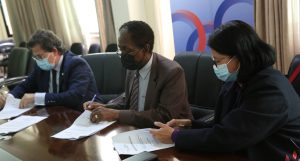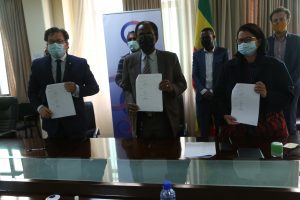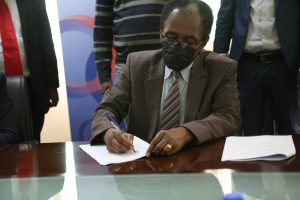On 10th February 2021, the Global Green Growth Institute Ethiopia Program signed a Memorandum of Understanding (MoU) with the Environment, Forest and Climate Change Commission (EFCCC) of the Federal Democratic Republic of Ethiopia and the Agence Française de Développement (AFD) for the Development of Ethiopia’s Long-Term Low Emission and Resilient Development Strategy (LT-LEDS) in the framework of the 2050 Facility. The specific objective of the proposed work is to support the Government of Ethiopia to develop a LT-LEDS (2050 horizon) document for submission to the UNFCCC, the planned activities will be financed by the AFD grant and implemented by GGGI in close collaboration with EFCCC. A steering committee composed of the actors of the MoU, Ministry of Finance, the National Planning and Development Commission and CRGE Line Ministries as well as other relevant actors in the areas will be established to evaluate and guide the program to achieve the desired outcome in alignment with similar initiatives carried out in the country.


The Government of Ethiopia is taking concrete actions to better manage adverse impacts and risks of climate change and climate variability. Accordingly, as a recognized leader on low carbon actions in clean power generation and landscape restoration, Ethiopia has made major progress in advancing its climate agenda. Over the past decade, the government has prioritized low-carbon growth, poverty reduction, and climate resilience. The country has been implementing its Climate Resilient Green Economy (CRGE) Strategy that was launched in 2011, well before many countries undertook obligations to reduce greenhouse gas (GHG) emissions and enhance climate resilience. Furthermore, Ethiopia has prepared its 10-year Development Plan (2021-2030), which considers a strong momentum towards large-scale investments in irrigation agriculture, broad-based rural development, and private sector involvement, along Ethiopia’s vision for green and resilient development. This prospective long-term development plan has 10 main pillars. CRGE is one of the 10 pillars and is also mainstreamed across all pillars.
Building on the CRGE/Nationally Determined Contributions (NDC) Implementation assessment; guided by the 10-years development plan as well as Improving the narrative of the NDC to align with the current 10-years perspective plan and also guided by international experience in NDC enhancement process (using the outcomes of the Paris agreement and the rule book), AFD and GGGI will support the Government of Ethiopia to develop its long term low emission and resilient development strategy in close coordination and alignment with other concerned stakeholders (including WRI’s TASCA NCE Ethiopia project). The program activities supported under this MOU are expected to be delivered in a period of 18 months.

